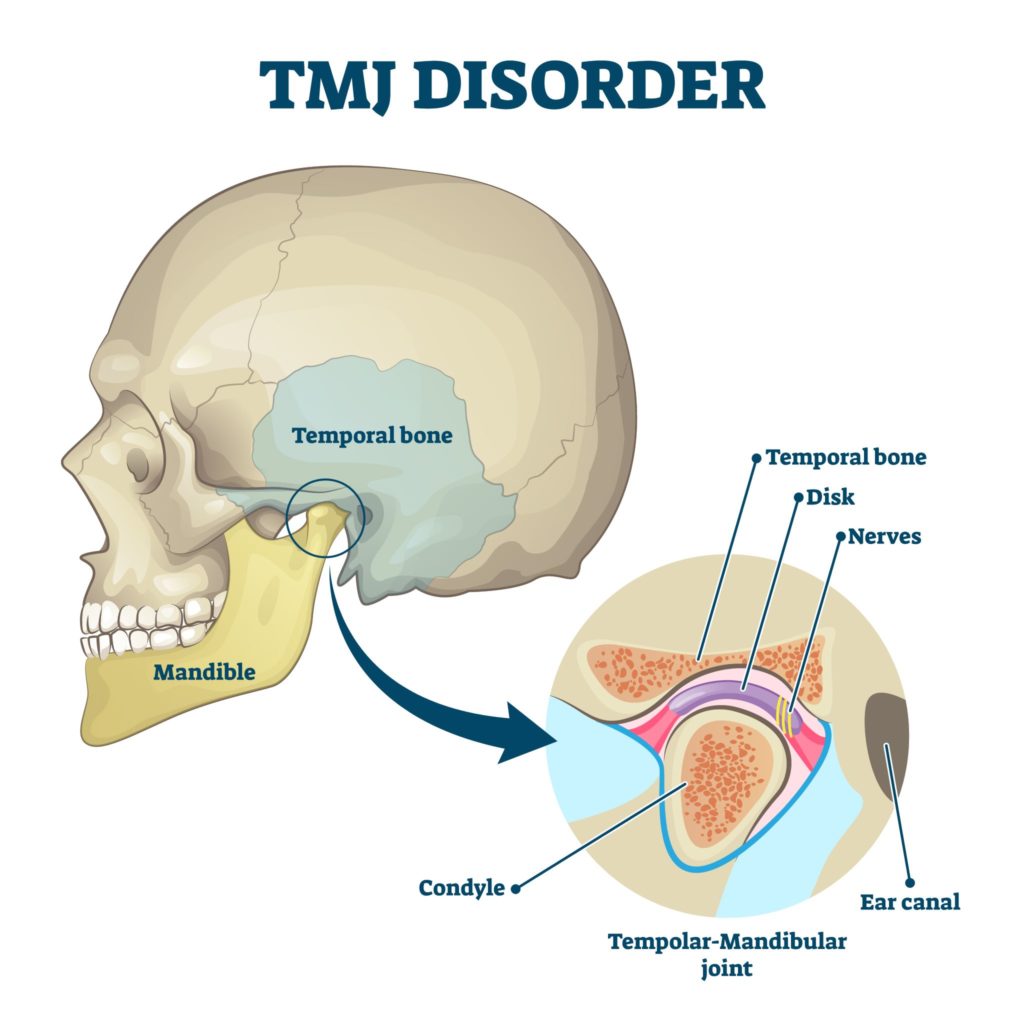
Temporomandibular joint dysfunction, better known as TMJ disorder, is a rather peculiar condition. In some cases, other medical issues cause the TMJ, and in other cases, TMJ causes the conditions.
What is that all about? And how do you know what came first? That’s important, after all, because treating the source will treat the symptoms. So does that mean you treat the jaw – or treat the condition that’s making your jawbones cause you pain?
Confusing, huh? Let us break it down for you.
What is Temporomandibular Joint Dysfunction?
The temporomandibular joint is located in front of each of your ears. This system of muscles, ligaments, cartilage, and the jawbone enable you to open and close your mouth, chew, and speak. The joints control the lower jaw as it moves forward, backward, and side to side. Each joint has a disc between the ball and socket. The disc serves as a cushion while enabling the jaw to open widely, rotate, and glide.
Temporomandibular joint dysfunction occurs for a number of reasons. Basically, anything that keeps the system from working properly may contribute to TMJ pain.
The National Institute of Dental and Craniofacial Research identifies TMJ in three ways:
- Myofascial pain
- Internal derangement of the joint, such as in the case of an injury
- Degenerative joint disease, such as in the case of osteoarthritis or rheumatoid arthritis in the jaw joint
What Conditions Cause TMJ Disorder?
Conditions that may lead to jaw pain include arthritis, dislocation of the jaw or related structures, an injury, and improper jaw alignment.
Is Tooth Grinding a Cause or Effect of TMJ?
It’s both. If you have a habit of grinding or clenching your teeth, this may irritate your jaw.
On the other hand, if you are experiencing jaw pain for another reason, this pain may cause you to involuntarily grind or clench your teeth. In that case, it’s a never-ending cycle, so our dentist and your general physician should help you pinpoint the source of your condition.
How About Headaches? Do They Come First or Second?
Headaches can be a cause and effect situation as well.
Typically, headaches are an effect of temporomandibular joint dysfunction. When you have TMJ disorder, you may bite improperly, clench your jaw, speak unnaturally, or perhaps even develop bad habits that affect your jaw, such as running your tongue along your gums to relieve pain. Any of these conditions will lead to headaches, and that’s especially true if you have a habit of grinding your teeth.

How Does TMJ Disorder Affect the Rest of Your Body?
As noted above, temporomandibular joint dysfunction symptoms include TMJ headaches, jaw tenderness, and clicking, popping, or momentary jamming or freezing in the jaw, especially when opening and closing your mouth. All of these conditions, especially the headaches, may lead to nausea and dizziness, as well as tenderness in your cheekbones. TMJ disorder may even compromise breathing airways.
How is the Condition Treated?
Temporomandibular joint dysfunction can be treated by addressing the underlying causes, such as controlling the stress that may be causing you to grind your teeth or taking medication that can relieve arthritis inflammation.
Self-treatment for TMJ can be helpful as well. TMJ exercises, for one, can both loosen and strengthen the joints and surrounding structures. Other options for self-care of temporomandibular joint dysfunction include:
- Eating softer foods
- Avoiding chewing gum
- Not biting your nails
- Applying heat packs to the area
- Practicing relaxation techniques to control jaw tension, such as meditation
Dental treatments for temporomandibular joint dysfunction include creating a mouthguard that can protect your teeth while you sleep at night. The dentist also may prescribe medications such as muscle relaxants, analgesics, anti-anxiety drugs, or anti-inflammatory medications.
The first step, however, is pinpointing what’s causing your condition. From there, we will determine whether the disorder itself must be treated or its causes must be addressed. Make an appointment with Dr. Holtzman for a review of your symptoms. Fortunately, many of the causes and symptoms of TMJ are highly treatable, and the results can offer tremendous relief.
